
Université Catholique de Bukavu
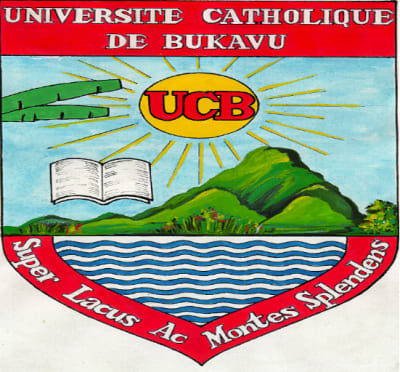
Introduction
TheBukavu Catholic University (UCB) Asbl, is one of the world's leading universities Democratic Republic of Congo. Located in the capital of the province of South Kivu, An eastern region of Patrice Emery Lumumba, was established on 21 November 1989 by decree of His Excellency Aloys MULINDWA Mutabesha, Archbishop of Bukavu.
In accordance with the Code of Canon Law, in its canons 807 to 814 and the Apostolic Constitution Ex Corde Ecclesiae of 15 August 1990 relating to Catholic universities and higher institutes,UCB Shines through its training to the overarching social objectives in a Region of Kivu, With a network of secondary schools providing the best of its students. Legally, it operates on the basis of Decree No. ESURS / CABMIN / 1231/91 of the Minister of Higher Education, University and Scientific Research; Decree No. ESURS / CABMIN / A5 / 175/95 approved and recognized the diplomas awarded by it; Final Decree No. 06/106 was signed by the President of the Republic on 12 June 2006. The Catholic University of Bukavu is currently one of the few in the country, authorized to organize a postgraduate training following the decree of the Ministry of Higher Education, University and Scientific Research N ° 020 of April 2, 2008.
Statutoryly,Bukavu Catholic University Pursues the following main objectives:
- To organize university teaching of science in all its forms, with a view to promoting Congolese intellectual frameworks and contributing to the socio-economic development of the country and more particularly of the Province of South Kivu;
- Conduct scientific research and publication of scientific studies in all subjects;
- Establish national and international scientific co-operation with a view to ensuring scientific development adapted to the needs and culture of the Congolese people;
- Encourage young students to understand the problems of society, to help resolve them and to actively contribute to the harmonious integration of Congolese culture into universal civilization;
- Organize higher education in science and technology and carry out scientific research and publication of scientific studies in collaboration with other educational and research institutions both at local and international levels;
- Contribute to the development of the Province and the Country by making available its expertise.
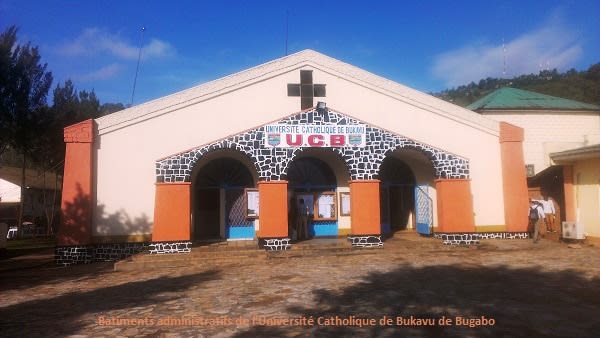
TheBukavu Catholic University Organizes quality teaching through its Faculties of Economics and Management (Financial Management, Rural Economy, Small and Medium Enterprises), by right (Public, Private and Judicial, Economic), Of Medicine (General, Surgery and Childbirth, Specialization in Medicine, Paediatrics, Surgery and Gynecology), Of Agronomic Sciences (Crop Science and Soil Sciences), Sciences (Computer sciences), Of Social Sciences. A Faculty of Architecture and Town Planning Will operate from the academic year 2017-2018.
Three miles forty-six (3046) Students are enrolled in all cycles for the academic year 2016-2017 including one thousand eight hundred and twenty-seven (1827) men and one thousand two hundred and nineteen (1219) women. An academic, scientific staff growing over the years provides full-time training. An administrative, technical and skilled worker contributes to the basic objectives of the "University. It currently has infrastructures that are constantly improving in search of a sustainable quality in its services. Courses are taught at Bugabo, Of Kalambo, Of Karhale And within the The General Provincial General Hospital of Bukavu Where the amphitheater of the Medical School. Rolling stock suitable for the transport of staff and students, the general computerization of its system, the opening up of its training without discrimination to nationals and foreigners and results-based management, make them an institution of Reference in the Province and the Country.
A training framework that responds to the conditions of university teaching allows learners to evolve better in both theoretical and practical learning. A free computer center for students and staff, a library of more than 38,295 volumes, one Bukavu Provincial General Reference Hospital Managed by theCatholic University of Bukavu, A Center of Excellence for the continuous training of civil servants financed jointly by the World Bank and the Congolese Government, farms from 100 ha to Kavumu And 60 ha in Mulume-Munene, an area of 80 ha where the campus Kalambo Constitute a reference of the UCB.
The CEGEC (Center for Study and Training for the Management and Prevention of Conflicts in the African Great Lakes Region - Faculty of Law), CEGEMI (Center for Research and Expertise in Mining Sector Management), CERDHO (Center for Research in Human Rights and International Humanitarian Law), CEFOSAR (Center for Studies and Training in Reproductive Health), CREBAC (Center for Bioethics), CAPPA (Support Center for The promotion of agricultural production), the LEAD (Laboratory of Applied Economics for Development), the PME-Start Cell (Small and Medium-sized Enterprises Management Unit), the ITADES (Institute for Statistical Processing and Analysis ), ... constitute research centers with a regional and international dimension and a field of research and learning Member of the International Federation of Catholic Universities (IFCU), of the'Agence Universitaire de la Francophonie (AUF),of the'Association of African Universities (AUA), of the'Association of Catholic Universities and Institutes of Africa and Madagascar (ASUNICAM), The "Bukavu Catholic University Has several partners at local, regional and international level such as IITA, CIALCA and RUFORUM. Super Lacus Ac Montes Splendens,Bukavu Catholic University Has been shining for twenty-seven years over the majestic Lake Kivu and the hills above it. Proud of its fruits that are now essential in all fields both at home and abroad, it pursues its quest for a quality university education to keep it in the forefront.
In the quest for excellence, the best is yet to come!
Our campuses
The Catholic University of Bukavu organizes its courses in four campuses, notably the Bugabo, Karhale, Kalambo and the Bukavu Provincial General Hospital.
The Campus of Bugabo
On the hill of Bugabo there is a sumptuous building full of history which currently houses the Central Administration, including the offices of the Rector, the Vice-Rector, the General Administrator and the Central Library. In its newly renovated annex, the Center of Excellence for the training of civil servants as well as postgraduate courses in law and economics. It was formerly a chapel - Sainte Thérèse - and subsequently the headquarters of the Coordination of the Catholic Conventional Schools which the Archdiocese decided to relocate so that, at its creation in 1989, the University could organize its teachings there.

The Karhale Campus
A little further up is the campus of Karhale on the hill of the same name. Formerly a medical laboratory in the province, this two-storey building and a ground floor house the Faculty of Agronomy and a student home. Says again Laboratory Dr André Lurhuma Zirhimw'abago, in memory of this valiant doctor and researcher specialist in surgery and delivery who died in June 1995; This building includes classrooms, research laboratories in agronomy and an annex, an amphitheater for first year students in Agronomy and Medicine.
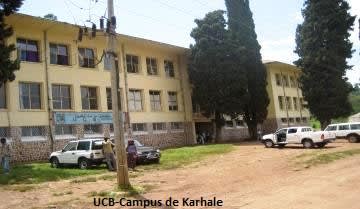
The amphitheater Stanislas Haumont
It is erected in the concession of the Provincial General Reference Hospital of Bukavu constitutes another learning site. The Faculty of Medicine operates there and uses the HGPRB, run by the Catholic University of Bukavu, as a teaching hospital. Faculty faculty members are also involved in the administration of care in this provincial hospital.
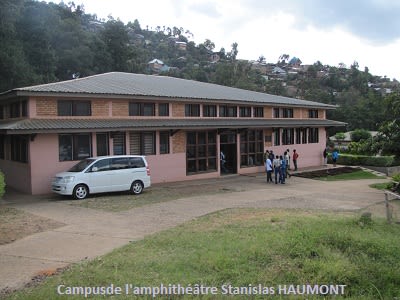
The Kalambo Campus
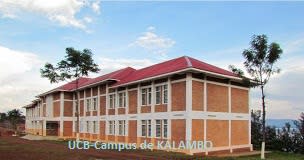
The site of Kalambo consists of 80 hectares and represents the future of the Catholic University of Bukavu called to settle there completely in the coming days. Located about 20 kilometers from the city of Bukavu, on a hill overlooking Lake Kivu, an enormous yard is in progress. On the plan of the university complex intended to be built there are already completed two main buildings housing respectively the Faculties of Economy, Law and Sciences that have been installed there since the academic year 2013-2014; Student homes and an agronomy lab in cooperation with IITA.